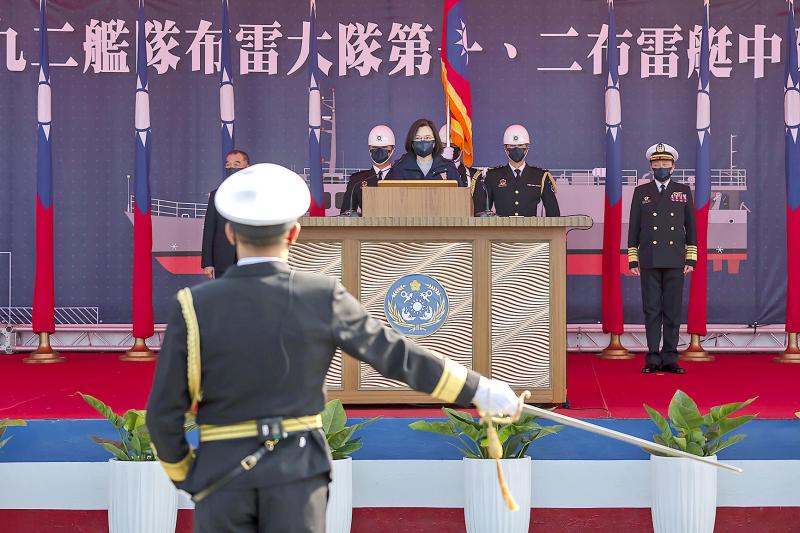The navy yesterday established its first two minelaying squadrons, each armed with one minelayer, at the Zuoying Naval Base in Kaohsiung.
“These are the first minelaying squadrons established by the Republic of China Navy,” President Tsai Ing-wen (蔡英文) said at a ceremony to mark the formation of the first and second minelaying squadrons under the 192nd Fleet. “I am glad we are able to witness this important moment together.”
Tsai said that the newly established forces show Taiwan’s achievement in building up its domestic defense industry and commitment to safeguarding the nation.

Photo: Taiwan Presidential Office via AP
The navy allocated NT$917.77 million (US$33.22 million) from 2017 to last year to build four rapid minelaying ships with the aim of enhancing Taiwan’s mine deployment capacity to better counter enemy threats.
Taiwanese manufacturer Lungteh Shipbuilding said that each minelayer is 41m long and 8.8m wide, and has a draft of 1.607m with a full-load displacement of 315 tonnes.
The minelayers are each armed with a T-75 20mm cannon on the bow, and a T-74 7.62mm machine gun and three mine-laying tracks on each side. The vessels are also equipped with an automatic mine-laying system developed by the Chungshan Institute of Science and Technology.
The ships, which can carry different types of mines, were delivered before the end of last year, but only two were put into active service yesterday.
The navy previously placed mines in the sea using landing ships, but that was not efficient and also potentially dangerous in choppy waters, Tsai said.
The minelayers built by Lungteh and equipped with the institute’s system would enable the navy to lay mines more efficiently and accurately, she said.
The Naval Fleet Command said the minelaying forces were established as part of the Ministry of National Defense’s efforts to bolster the nation’s asymmetric defense capabilities.
The new forces can collaborate with allies to jointly deter and delay the landing of enemy forces, it said.
Institute for National Defense and Security Research analyst Su Tzu-yun (蘇紫雲) said that mines are “cheap and highly effective denial weapons” that can disrupt an enemy’s advance and force their vessels to alter planned routes.
They can be also used in conjunction with anti-ship missiles to strengthen the country’s defense, he added.

AGING: As of last month, people aged 65 or older accounted for 20.06 percent of the total population and the number of couples who got married fell by 18,685 from 2024 Taiwan has surpassed South Korea as the country least willing to have children, with an annual crude birthrate of 4.62 per 1,000 people, Ministry of the Interior data showed yesterday. The nation was previously ranked the second-lowest country in terms of total fertility rate, or the average number of children a woman has in her lifetime. However, South Korea’s fertility rate began to recover from 2023, with total fertility rate rising from 0.72 and estimated to reach 0.82 to 0.85 by last year, and the crude birthrate projected at 6.7 per 1,000 people. Japan’s crude birthrate was projected to fall below six,

US President Donald Trump in an interview with the New York Times published on Thursday said that “it’s up to” Chinese President Xi Jinping (習近平) what China does on Taiwan, but that he would be “very unhappy” with a change in the “status quo.” “He [Xi] considers it to be a part of China, and that’s up to him what he’s going to be doing, but I’ve expressed to him that I would be very unhappy if he did that, and I don’t think he’ll do that. I hope he doesn’t do that,” Trump said. Trump made the comments in the context

SELF-DEFENSE: Tokyo has accelerated its spending goal and its defense minister said the nation needs to discuss whether it should develop nuclear-powered submarines China is ramping up objections to what it sees as Japan’s desire to acquire nuclear weapons, despite Tokyo’s longstanding renunciation of such arms, deepening another fissure in the two neighbors’ increasingly tense ties. In what appears to be a concerted effort, China’s foreign and defense ministries issued statements on Thursday condemning alleged remilitarism efforts by Tokyo. The remarks came as two of the country’s top think tanks jointly issued a 29-page report framing actions by “right-wing forces” in Japan as posing a “serious threat” to world peace. While that report did not define “right-wing forces,” the Chinese Ministry of Foreign Affairs was

PREPAREDNESS: Given the difficulty of importing ammunition during wartime, the Ministry of National Defense said it would prioritize ‘coproduction’ partnerships A newly formed unit of the Marine Corps tasked with land-based security operations has recently replaced its aging, domestically produced rifles with more advanced, US-made M4A1 rifles, a source said yesterday. The unnamed source familiar with the matter said the First Security Battalion of the Marine Corps’ Air Defense and Base Guard Group has replaced its older T65K2 rifles, which have been in service since the late 1980s, with the newly received M4A1s. The source did not say exactly when the upgrade took place or how many M4A1s were issued to the battalion. The confirmation came after Chinese-language media reported